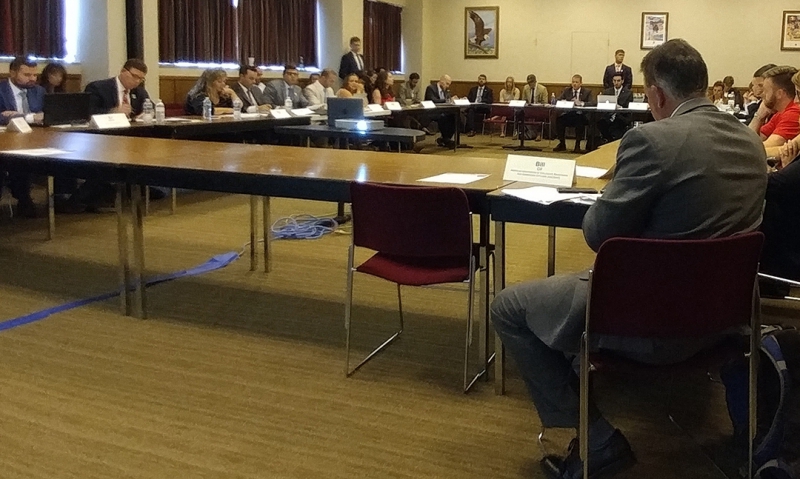
American Legion and Student Veterans of America lead a roundtable discussion on how to improve the GI Bill and better serve the veteran community.
The American Legion, in tandem with Student Veterans of America (SVA), conducted a roundtable meeting May 18 at the Legion’s Washington, D.C., office to discuss how to improve the Post-9/11 GI Bill and better serve the veteran community.
More than 75 representatives from local veteran and military service organizations, as well as government and congressional offices, attended the meeting. John Kamin, assistant director of the Legion’s Veterans Employment and Education Division, and SVA Government Affairs Vice President William Hubbard, led the discussion.
“There have been a lot of public disagreements over the past few weeks on how to improve the GI Bill,” Kamin said. “We felt it was important to work with Student Veterans of America to bring all of our veterans organizations together to discuss these challenges as a community.”
Although not every organization has a direct focus on veterans education, Kamin said their attendance sent a very powerful statement that improving the GI Bill is a national priority.
“I think this conversation, having 60-plus people in the room, made it real,” High Ground Veterans Advocacy Executive Director Kristofer Goldsmith said during a separate open press meeting. “This isn’t some Twitter spat – it’s not a hashtag war. We’re representatives of millions of veterans across the country and we all believe that the GI Bill needs to be improved.”
According to the U.S. Department of Veterans Affairs website, “The Post-9/11 GI Bill is an education benefit program for individuals who served on active duty after September 10, 2001. For approved programs, this bill provides up to 36 months of education benefits, generally payable for 15 years following one’s release from active duty.” Veterans may be eligible for this VA-administered program if they:
1. Have at least 90 days of aggregate active duty service after Sept. 10, 2001, and are still on active duty;
2. Are an honorably discharged veteran; or
3. Were discharged with a service-connected disability after 30 days.”
Aleks Morosky, legislative director for the Military Order of the Purple Heart, said he’d like to see a change in the service requirement associated with Purple Heart recipients getting full benefits under the Post-9/11 GI Bill.
“(There are) currently about 1,500 post-9/11 Purple Heart recipients who receive less than the full benefit and we’d like to see that fixed,” said Morosky. “We think that if you’ve been wounded on the battlefield, then you’ve met the service requirement. I think we ought to give them the best educational opportunities we can.”
During the roundtable, Hubbard guided a discussion about the modernization of the GI Bill that included assessing priorities and reviewing several draft bills/policy proposals. Each organization was also given a sheet with a list of House resolution bills, asking whether they support, oppose, have a pending decision or no position at all on the bills.
“The purpose of this was to develop an understanding, identify areas where we had a consensus on, and then generally speaking, what we (want to have further discussions about which include) the Purple Heart recipients, the orders issue, the school closures and the Yellow Ribbon (Program),” said Hubbard. “I think the consensus was that we want to do something, 100 percent. I didn’t hear anyone say anything less than that. What that ends up looking like, and to the extent that we are able to address it, I think there’s some conversations still to be had there. The four items that we’re pushing on, every single one of those needed to happen yesterday. That’s the message we’ll be carrying to the Hill.”
For Goldsmith, the roundtable helped to establish a consensus around closing the current GI Bill loopholes. Better serving the veteran community entails changing the dialogue and not settling for the status quo, he said.
“We’re expanding the GI Bill. We’re continuing to move forward. We’re not settling for the status quo … and the plan is to stop doing just that,” said Goldsmith. “These vets can’t wait for Congress to get it done. The consensus that’s coming out of this room today is how are we going to result in a letter with a ton of cosigners, saying these are the priorities and these are what we need. We’re not giving (Congress) a deadline. It just needs to be done as soon as possible.”
Kamin said making sure veterans receive the full GI Bill benefits they deserve is a priority that the Legion and other veteran service organizations will stand behind. “We will not turn our backs on National Guard and reserve servicemembers who have been denied the GI Bill because they were on health care or 12304b deployment orders, or student veterans who have lost their GI Bill attending closed schools,” he said. “Making sure that they receive the full benefits of the GI Bill is more than a common-sense solution; it is a necessity we must ensure.”
- Veterans Benefits

